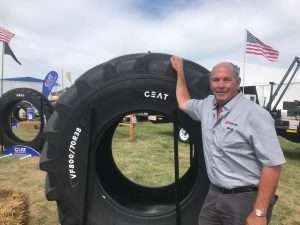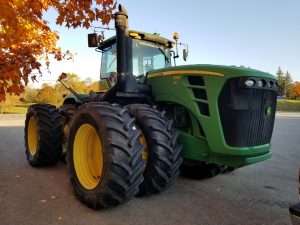Are you in the market for farm tractor tires? Here’s some key information you’ll need to find the right tires for your equipment and applications.
Tractor tires in the U.S. are regulated by the Department of Transportation and are given an “agricultural” tire classification which includes tractors, as well as combines, harvesters, sprayers, trailers and other heavy agricultural equipment. Ag tires have very prominent, strategically placed lugs in order to grip the terrain they are traditionally used on.
The rims on your farm tractor tires are a direct determinant of the diameter of the tire. Your tractor tires should always match the rim size.
Tractor tires are always classified in size by “width” and “rim diameter.” Or you can see tractor tires with three numbers on the sidewall. Sometimes, you’ll see them advertised with three numbers, which would signify “height,” “width” and “rim diameter.”
Sizing in terms of millimeters (mm) has become more common but you may come across tractor tires advertised not in inches but millimeters. For instance, for the CEAT FARMAX R85 farm tractor tire, the size will appear as “420/85R30.” This sizing is the equivalent standard of 16.9R30.
Section Width: The “420” refers to the section width of the tire in millimeters. Divide the 420 by 25.4 and you will get the standard measurement. These conversions don’t always calculate out exactly. The section width is the widest measurement of the tire normally at the center of the sidewall on the bottom side of the tire with a standard inflation pressure and standard load.
Aspect Ratio: The “85” is the aspect ratio of the tire. This is the ratio of the sidewall height to the section width of the tire. In this case the sidewall height is 85% of the section width of the tire. If the “85” is not in the sizing, you have a bias tire and the aspect ratio is a standard “85.”
“R”: The “R” stands for radial. If there is no “R” then you have a bias tire. Usually, the bias tires use a dash in place of the “R.”
Rim Diameter: The rim diameter is stated in inches, and in this example it is “30.”
Load Index/Speed Rating: Right after the sizing you will find the load index/speed rating for the tire. In this example it is “140 A8.” The “140” is the load index and the corresponding load can be found in the standard load table — it equals 7,165#. The speed rating is the “A8/B”. This tire has a dual speed rating. This speed rating equivalent can be found in the Speed Rating tables and “A8” equals 25 mph and the “B” equals 31 mph. In this case, the same 7,165# load can be carried at 31 mph with the maximum inflation pressure. In most cases with dual speed ratings the second speed rating is higher than the first speed rating and is quite often followed by a reduced or devalued load index. If this is the case with a dual speed rating and a dual load index, the tire is rated to carry a reduced load at higher speeds. A tires’ load index/speed ratings are determined by the heaviest load at the highest speed. If you have a dual marked tire with the load devalued for higher speed, the load index is the lower speed and the heavier load.
Maximum Inflation Pressure: The maximum recommended inflation pressure is identified on each tire. In this example you will find an inflation statement that says 23 psi is the maximum inflation pressure.
Directional Symbol: Some tires will have a circle on the sidewall with an arrow incorporated that shows the direction the tire is designed to rotate.
Manufacture Date Code: There is always an oval stamped into the sidewall near the bead that most often has one or two letters followed by four numbers. The letters signify the plant the tire was built in, and the numbers are the date code. The first two numbers are the week of the year, and the last two numbers are the last two numbers of the year.
Maximum Mounting Inflation Pressure: All Ag tires should have a picture of a section cut of a tire with a triangle inside with a statement of the maximum inflation pressures to use when seating the bead to the rim during mounting.
Ply Rating: You may see something like a “12pr or 12 ply” following the size of the tire and no load index/speed rating. This designation would be on bias tires and refers to the carcass strength which is a 12-ply rating. The higher the pr or ply number the stronger the carcass strength. This number is purely a strength of carcass number and does not refer to the actual number of carcass plies that are utilized in the manufacturing of the tire. There is no good way to convert ply ratings to the load index of radials and vis versa. Radials have a load index/speed rating, and bias tires have a ply or pr rating.
Service Type Description: These markings indicate the type of service the tire has been designed for. There are various types that include implement, forestry, industrial, loader, multipurpose as well as agroforestry and others.
Service Description: Some tires may have a service description symbol on the sidewall. These symbols are normally a circle with and arrow point incorporated in the circle which indicates a drive tire. If there is a circle with an arrow that is extended outside the circle you are looking at a free rolling or non-drive tire.
Tractor Tire Tube: One or the other designation will be present on the sidewall. When you see a tube type designation the tire needs to have a tube installed for mounting and service. Tubeless indicates the tire is designed for use without a tube. You may add a tube to a tubeless tire if needed especially when utilizing liquid ballast.
Tires without tubes last longer, as they are far easier to repair and do not require you to remove the tire, then remove the tube for repair work. Tubes are generally a requirement for tires that require liquid ballast, which is inserted into the tube itself. The choice for tubed versus no-tube tires ultimately weighs on this requirement, or purely on the tractor operator’s preference.
Steel Belted: Some Ag tires will have “steel belted” on the sidewall which indicates steel belting
Lots of information to digest. Your tire dealer can break it all down for you, and tire manufacturer websites are also great sources of information for a tractor tire size chart.











































